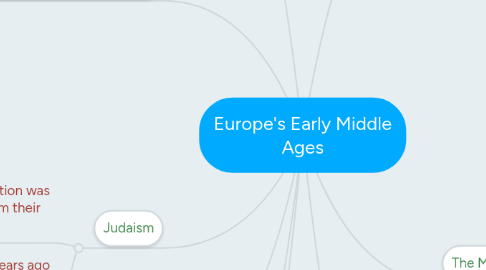
1. The Franks
1.1. Farmers
1.2. Group of Germanic people
1.3. Loved war
1.4. Franks meant Free
1.5. SALIC CODE: Law of the Franks differed greatly from the roman law
1.5.1. monetary value placed on every person and every piece of property
1.5.1.1. if crime was committed, criminals had to pay the" wergild " (fine) to the victims
1.5.1.2. for murders, the victim family could choose that the criminal die
1.6. Everyday life of the franks
1.6.1. social classes
1.6.2. 60% of franks were serfs (or peasents)
1.6.3. serfs: worked on the land of their lords manor, or estate
1.6.4. Not aloud to move away from their manor
1.6.5. Storms and Droughts caused hardships; lords and rulers steal their crops; merchants raised prices when food was sacre
1.7. fourth/ early fifth century
1.7.1. Later on settled in France
2. The Merovingians
2.1. Royal Family
2.2. Ruled the franks for over 300 years
2.3. Most successful ruler - Clovis I
2.3.1. Clovis I found the country France and made Paris its capital
2.3.2. After Clovis' death, kindom was divided against his children
2.4. Kindom fell into chaos
3. Charlemage
3.1. He Brought peace
3.1.1. leader in western Europe in 768 A.D.
3.1.1.1. Intrested in rebuilding civiliazation
3.1.1.2. expanded the merovingian empire to become the carolingian empire
3.1.1.3. Carolingian Empire gave Europe a rest from wars
3.2. He treated many of his people well
3.2.1. He sent " missi dominica " to make sure people were treated properly
3.2.1.1. He tried to make things better for serfs and tradepeople
3.2.1.2. Improved Education
3.2.1.3. Revived arts and Science
3.3. Could be Hardhearted and Merciless
3.3.1. insisted conquering people to convert to christianity
3.3.1.1. ordered 4,000 saxons killed in one day for refusing to convert
4. Christianity
4.1. Found in Palestine by apostles of Jesus Christ
4.1.1. Jesus taught to love god with your whole being and to love your neighbour as yourself
4.1.1.1. Romans killed Jesus because they were scared of anyone uprising against them
4.1.1.1.1. Killed him by nailing him to a cross
4.1.1.1.2. Followers believed he was raised from the dead so everyone could share the eternal life
4.2. Roman Emperor Constantine converted to christianity in 313c.e
5. The Anglo-Saxons and The Celts
5.1. Roman soldiers left Britain in 5th century
5.1.1. Warriors from the area known as Germany the Angels, Saxons, and Jutes moved in
5.1.2. Later Germanic invaders settled in Britain and pushed the Celts into Wales, Cornwall, and Scotland as well as across the sea to Ireland.
5.1.2.1. Invaders were known as the Anglo-Saxons or English
5.2. Celts=powerful people who inhabited much of Europe from Spain to southern Russia
5.2.1. Celtic Language disappeared from the seven kingdoms.
5.3. Were farmers like the Franks
5.3.1. Lived in small villages, men and women shared the hard work of agriculture between them
5.3.1.1. Had skilled metal workers
5.4. Anglo-Saxons suffered in the 9th century from viking raids.
6. Judaism
6.1. Roman times, the whole jewish population was forced to move to distant lands far from their homes.
6.1.1. Diaspora was known as the final scattering of the Jewish people from Palestine.
6.1.1.1. Diaspora caused active jewish communities to develop in most of the major cities of the mediterranean.
6.2. Was found over 3500 years ago
6.2.1. Abraham was the main finder
6.2.1.1. Formed in 1810 B.C.
6.2.1.1.1. Torah is its foundational text.
7. Islam
7.1. spread rapidly into Asia, Africa, and Europe when the muslims conquered Spain in 711AD.
7.1.1. Muhammad was the founder of Islam
7.1.1.1. Muhammad introduced islam un 610ad after experiencing what he claimed to be an angelic visitation
7.1.2. 610 AD is when it was found
7.1.2.1. Beliefs - fasting, in one allah, in the prophets,etc.
8. Byzantines Empire
8.1. very religious
8.1.1. justinian I and theadora were the most important rulers
8.1.1.1. Justinian became one of the most capable leaders in the history of europe
8.1.1.1.1. Justinian was interested in politics, arts, literature, religion, music, and sciences
8.1.1.2. Theodora was just as powerful as Justinian but she brought in reforms that gave women the right to keep any property they inherited
